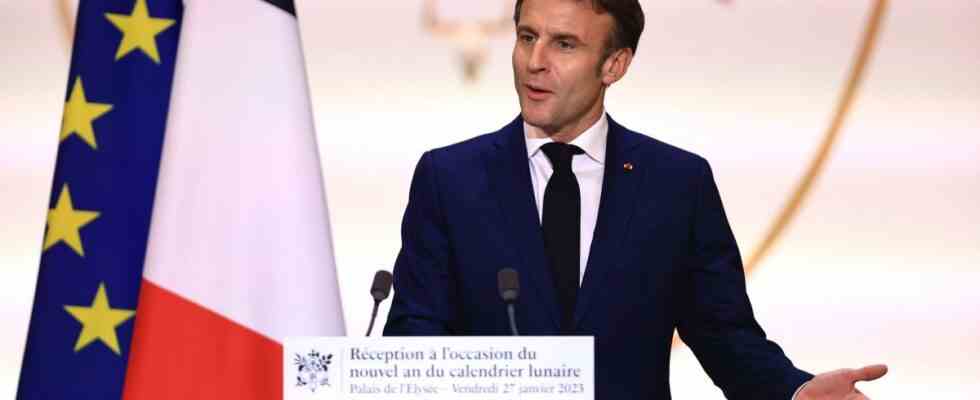fFrance’s President Emmanuel Macron has still not decided whether Ukraine should also receive French main battle tanks. So far, however, there has been no international criticism of Macron’s position – in contrast to the sometimes violent reactions to Chancellor Olaf Scholz’s (SPD) long hesitation. This should not least be due to Macron’s more skilful communication.
“Everyone was quick to point the finger at Germany,” says Gaspard Schnitzler, a defense expert at the Institute for International and Strategic Relations (Iris) in Paris. The procrastinating chancellor has become the target of criticism. However, there are also a number of factual reasons why the delivery of French Leclerc tanks makes less strategic sense.
“There are only about 220 Leclerc tanks operational. Production stopped in 2008,” says Schnitzler. By contrast, there are around 2,000 of the German Leopard tanks. “This makes it easier to supply spare parts,” explains the expert. While several European armies use Leopard tanks, the Leclerc tank is used only by France, Jordan and the United Arab Emirates.
The 56-ton Leclerc tank is capable of hitting a target four kilometers away while moving
Source: AP/Vadim Ghirda
Another important point is the training of Ukrainian soldiers. “It’s more efficient to agree on a single system,” says Schnitzler. Therefore, the delivery of a few Leclerc tanks as a symbolic gesture is not very helpful.
However, it is also not true that Ukraine does not want Leclerc tanks at all, as some French politicians have implied. Last week, the Ukrainian Ministry of Defense released another curious video praising the advantages of the Leclerc tank with chansons and Sartre quotes. He is about “sporty” and “easy to park”.
In fact, the 56-ton Leclerc is capable of hitting a target four kilometers away while driving. France currently has 13 of its Leclerc tanks deployed in Romania to protect NATO’s eastern flank.
The fact that France itself has so few heavy battle tanks is also due to the fact that the country relies on its nuclear deterrent. “France is equipped,” reminds Macron from time to time – and everyone knows with what.
All developments in the live ticker:
09:08 – Russia to plan new offensive
According to Kremlin insiders, Russia should prepare a new offensive in the war in Ukraine for February or March 2023 in order to regain the initiative. That reports the Bloomberg news agency. The assessment coincides with the analysis of the think tank Institute of War (ISW), which assumes that Putin is planning “most likely in the Luhansk region” in order to still win this war after the previous failures. “Recent limited Russian ground attacks in the Zaporizhia Oblast may be aimed at dispersing Ukrainian forces and setting the stage for an offensive in Luhansk,” the ISW said. An offensive from Belarus, on the other hand, is not considered likely, and troops from there are already said to be moving to Luhansk. The ISW also reports that Russian prisoners who wanted to take part in the operation are already being pardoned.
1:00 am – Israel is helping Ukraine ‘behind the scenes’
According to the Israeli ambassador to Germany, Ron Prosor, his country supports Russia’s attacked Ukraine more than is publicly known. Israel is helping, “but behind the scenes and much more than is known,” the diplomat told the newspapers of the Funke media group (Saturday).
He asked for understanding for the Israeli reticence on the subject: “We have the Russians in Syria. As you know, the Israeli army regularly blocks arms shipments from Iran to Syria and Lebanon. These include Iranian drones and missiles that Russia is using in Ukraine,” Prosor said. He also stated that there is a large Jewish community in Russia. “Those are the two main reasons we’re keeping a low profile.”
Although Israel has repeatedly condemned Russia’s war of aggression in Ukraine, the new Foreign Minister Eli Cohen recently promised Kyiv that humanitarian aid would continue. Overall, however, the country has remained rather cautious and has so far strictly refused arms deliveries to Ukraine. Among other things, Russia has a major influence on the situation in Syria. In the neighboring country, Israel wants to prevent its arch-enemy Iran and militias allied with it, such as Hezbollah, from expanding their military influence.
00:36 – UNHCR: Russia violates child protection in wartime
According to the head of the United Nations High Commissioner for Refugees (UNHCR), Russia violates the principles of protecting children in times of war. “Giving them (Russian) citizenship or adopting them goes against the basic principles of child protection in wartime situations,” Grandi said in a Reuters interview during a visit to the UNHCR office in Kyiv.
The refugee organization is unable to estimate the number of children affected because access to them in Russia is extremely restricted. Russian Foreign Ministry spokeswoman Maria Zakharova told journalists that Grandi had not commented on the children who died from Ukrainian shelling in Donbass. She also wished that “such United Nations officials would have taken note of the colossal humanitarian aid that Russia has provided to the residents of the region.”
20:37 – Ukraine gets 321 main battle tanks
According to Ukraine, it has received commitments from several countries for a total of 321 main battle tanks. This is what the Ukrainian ambassador in France tells the BFM broadcaster.
“Kick-off Politics” is WELT’s daily news podcast. The most important topic analyzed by WELT editors and the dates of the day. Subscribe to the podcast at Spotify, Apple Podcasts, Amazon Music or directly via RSS feed.

